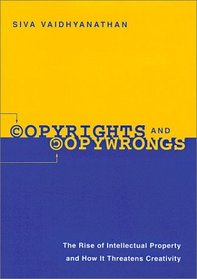Search -
Copyrights and Copywrongs: The Rise of Intellectual Property and How It Threatens Creativity (Fast Track Books)
Copyrights and Copywrongs The Rise of Intellectual Property and How It Threatens Creativity - Fast Track Books
Author:
"It has taken lawyers 200-plus years to morph copyright law from the balanced compromise that our framers struck to the extraordinary system of control that it has become. In this beautifully written book, a nonlawyer has uncovered much of the damage done. Copyrights and Copywrongs is a rich and compelling account of the bending of American ... more »
Author:
"It has taken lawyers 200-plus years to morph copyright law from the balanced compromise that our framers struck to the extraordinary system of control that it has become. In this beautifully written book, a nonlawyer has uncovered much of the damage done. Copyrights and Copywrongs is a rich and compelling account of the bending of American ... more »
ISBN-13: 9780814788066
ISBN-10: 0814788068
Publication Date: 8/1/2001
Pages: 243
Rating: ?
ISBN-10: 0814788068
Publication Date: 8/1/2001
Pages: 243
Rating: ?
0 stars, based on 0 rating
Publisher: New York University Press
Book Type: Hardcover
Members Wishing: 0
Reviews: Amazon | Write a Review
Book Type: Hardcover
Members Wishing: 0
Reviews: Amazon | Write a Review
Genres:
- History >> Americas >> United States >> 20th Century >> General
- Nonfiction >> Social Sciences >> General
- Law >> Intellectual Property >> General
- Law >> Intellectual Property >> Patent, Trademark & Copyright
- Engineering & Transportation >> Law >> Intellectual Property >> General
- Engineering & Transportation >> Law >> Intellectual Property >> Patent, Trademark & Copyright




